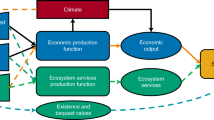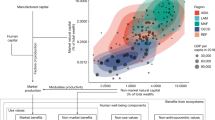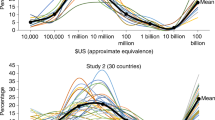Abstract
Climate change is often described as the greatest environmental challenge of our time. In addition, a changing climate can reallocate natural capital, change the value of all forms of capital and lead to mass redistribution of wealth. Here we explain how the inclusive wealth framework provides a means to measure shifts in the amounts and distribution of wealth induced by climate change. Biophysical effects on prices, pre-existing institutions and socio-ecological changes related to shifts in climate cause wealth to change in ways not correlated with biophysical changes. This implies that sustainable development in the face of climate change requires a coherent approach that integrates biophysical and social measurement. Inclusive wealth provides a measure that indicates sustainability and has the added benefit of providing an organizational framework for integrating the multiple disciplines studying global change.
This is a preview of subscription content, access via your institution
Access options
Subscribe to this journal
Receive 12 print issues and online access
$209.00 per year
only $17.42 per issue
Buy this article
- Purchase on Springer Link
- Instant access to full article PDF
Prices may be subject to local taxes which are calculated during checkout



Similar content being viewed by others
References
Does Income Inequality Hurt Economic Growth? (Directorate for Employment, Labour and Social Affairs, OECD, 2014).
Stiglitz, J. E., Sen, A., Fitoussi, J.-P. Mis-measuring Our Lives: Why GDP Doesn't Add Up (New Press, 2010).
UNU-IHDP and UNEP Inclusive Wealth Report 2014: Measuring Progress Toward Sustainability (Cambridge Univ. Press, 2014).
Agarwala, M., Atkinson, G., Baldock, C. & Gardiner, B. Natural capital accounting and climate change. Nature Clim. Change 4, 520–522 (2014).
Parry, M. L., Canziani, O. F., Palutikof, J. P., van der Linden, P. J. & Hanson, C. E. (eds) Climate Change 2007: Impacts, Adaptation and Vulnerability (IPCC, Cambridge Univ. Press, 2007).
Nelson, E. J. et al. Climate change's impact on key ecosystem services and the human well-being they support in the US. Front. Ecol. Environ. 11, 483–893 (2013).
O'Brien, K. L. & Leichenko, R. M. Double exposure: assessing the impacts of climate change within the context of economic globalization. Glob. Environ. Change 10, 221–232 (2000).
O'Brien, K. & Leichenko, R. Climate change, equity and human security. Die Erde 137, 165–179 (2006).
Adger, W. N. Fairness in Adaptation to Climate Change (MIT, 2006).
Cheung, W. W. L., Close, C., Lam, V., Watson, R. & Pauly, D. Application of macroecological theory to predict effects of climate change on global fisheries potential. Mar. Ecol. Prog. Ser. 365, 187–197 (2008).
Turner, W. R. et al. Climate change: helping nature survive the human response. Conserv. Lett. 3, 304–312 (2010).
Quaas, M. F., Reusch, T. B., Schmidt, J. O., Tahvonen, O. & Voss, R. It is the economy, stupid! Projecting the fate of fish populations using ecological-economic modeling. Glob. Change Biol. 22, 264–270 (2016).
Tavoni, A. & Levin, S. A. Managing the climate commons at the nexus of ecology, behaviour and economics. Nature Clim. Change 4, 1057–1063 (2014).
Dasgupta, P. Human Well-Being and the Natural Environment (Oxford Univ. Press, 2007).
Adger, W. N., Arnell, N. W. & Tompkins, E. L. Successful adaptation to climate change across scales. Glob. Environ. Change 15, 77–86 (2005).
Eriksen, S. et al. When not every response to climate change is a good one: Identifying principles for sustainable adaptation. Clim. Dev. 3, 7–20 (2011).
Denton, F. et al. in Climate Change 2014: Impacts, Adaptation, and Vulnerability. Part A: Global and Sectoral Aspects (eds Field, C. B. et al.) 1101–1131 (IPCC, Cambridge Univ. Press, 2014)
Heal, G. Reflections—defining and measuring sustainability. Rev. Environ. Econ. Policy 6, 147–163 (2012).
Hanley, N., Dupuy, L. & McLaughlin, E. Genuine savings and sustainability. J. Econ. Surv. 29, 779–806 (2015).
Dasgupta, P. The welfare economic theory of green national accounts. Environ. Resour. Econ. 42, 3–38 (2009).
Dasgupta, P. Measuring the wealth of nations. Annu. Rev. Res. Econ. 6, 17–31 (2014).
Arrow, K. et al. Are we consuming too much? J. Econ. Perspect. 18, 147–172 (2004).
Pearson, L. J., Biggs, R., Harris, M. & Walker, B. Measuring sustainable development: the promise and difficulties of implementing Inclusive Wealth in the Goulburn-Broken Catchment, Australia. Sustain. Sci. Pract. Policy 9, 16–27 (2013).
Miller, K. A. & Munro, G. R. Climate and cooperation: a new perspective on the management of shared fish stocks. Mar. Resour. Econ. 19, 367–393 (2004).
Sumaila, U. R., Cheung, W. W. L., Lam, V. W. Y., Pauly, D. & Herrick, S. Climate change impacts on the biophysics and economics of world fisheries. Nature Clim. Change 1, 449–456 (2011).
Chen, I.-C., Hill, J. K., Ohlemüller, R., Roy, D. B. & Thomas, C. D. Rapid range shifts of species associated with high levels of climate warming. Science 333, 1024–1026 (2011).
Pinsky, M. L., Worm, B., Fogarty, M. J., Sarmiento, J. L. & Levin, S. A. Marine taxa track local climate velocities. Science 341, 1239–1242 (2013).
Poloczanska, E. S., Hoegh-Guldberg, O., Cheung, W. W. L., Pörtner, H. O. & Burrows, M. T. in Climate Change 2014: Impacts, Adaptation, and Vulnerability. Part A: Global and Sectoral Aspects (eds Barros, V. R. et al.) 123–127 (IPCC, Cambridge Univ. Press, 2013).
Lin, H. et al. Spatio-temporal dynamics on the distribution, extent, and net primary productivity of potential grassland in response to climate changes in China. Rangeland J. 35, 409–425 (2013).
Petitgas, P. et al. Anchovy population expansion in the North Sea. Mar. Ecol. Prog. Ser. 444, 1–13 (2012).
Mendelsohn, R. O. The economics of adaptation to climate change in developing countries. Clim. Change Econ. 3, 1250006 (2012).
Mendelsohn, R. & Dinar, A. Climate Change and Agriculture: An Economic Analysis of Global Impacts, Adaptation, and Distributional Effects (Edward Elgar, 2009).
Lawler, J. J. et al. Resource management in a changing and uncertain climate. Front. Ecol. Environ. 8, 35–43 (2010).
Ostrom, E. Governing the Commons: The Evolution of Institutions for Collective Action (Cambridge Univ. Press, 1990).
Stavins, R. N. The problem of the commons:still unsettled after 100 years. Am. Econ. Rev. 101, 81–108 (2011).
Libecap, G. D. Contracting for Property Rights (Cambridge Univ. Press, 1994).
Reed, W. J. & Heras, H. E. The conservation and exploitation of vulnerable resources. Bull. Math. Biol. 54, 185–207 (1992).
Dasgupta, P. & Maler, K.-G. Net national product, wealth, and social well-being. Environ. Dev. Econ. 5, 69–93 (2000).
Barbier, E. B. Wealth accounting, ecological capital and ecosystem services. Environ. Dev. Econ. 18, 133–161 (2013).
Barbier, E. B. Account for depreciation of natural capital. Nature 515, 32–33 (2014).
Fisher, I. The Nature of Capital and Income (Norwood, 1906).
Hotelling, H. The economics of exhaustible resources. J. Polit. Econ. 39, 137–175 (1931).
Arrow, K. J., Dasgupta, P. & Maler, K.-G. Evaluating projects and assessing sustainable development in imperfect economies. Environ. Resour. Econ. 26, 647–685 (2003).
Arrow, K. J., Dasgupta, P., Goulder, L. H., Mumford, K. J. & Oleson, K. Sustainability and the measurement of wealth. Environ. Dev. Econ. 17, 317–353 (2012).
World Commisson on Environment and Development Our Common Future (Oxford Univ. Press, 1987).
Fenichel, E. P. & Abbott, J. K. Natural capital from metaphor to measurement. J. Assoc. Environ. Res. Econ. 1, 1–27 (2014).
Inklaar, R. & Timmer, M. P. Capital, Labor and TFP in PWT8.0. (Groningen Growth and Development Centre, University of Groningen, 2013); http://www.rug.nl/research/ggdc/data/pwt/v80/capital_labor_and_tfp_in_pwt80.pdf
Fenichel, E. P. et al. Measuring the value of groundwater and other forms of natural capital. Proc. Natl Acad. Sci. USA http://dx.doi.org/10.1073/pnas.1513779113 (2015).
Miranda, M. J. & Fackler, P. L. Applied Computational Economics and Finance (MIT, 2002).
Jorgenson, D. W. Capital theory and investment behavior. Am. Econ. Rev. 53, 247–259 (1963).
McCay, B.J., Brandt, S. & Creed, C. F. Human dimensions of climate change and fisheries in a coupled system: the Atlantic surfclam case. ICES J. Mar. Sci. 68, 1354–1367 (2011).
Pinsky, M. L. & Fogarty, M. J. Lagged social-ecological responses to climate and range shifts in fisheries. Climatic Change 115, 883–891 (2012).
Pörtner, H. & Knust, R. Climate change affects marine fishes through the oxygen limitation of thermal tolerance. Science 315, 95–97 (2007).
Bates, A. E. et al. Defining and observing stages of climate-mediated range shifts in marine systems. Glob. Environ. Change 26, 27–38 (2014).
Worm, B. et al. Rebuilding global fisheries. Science 325, 578–585 (2009).
Behrenfeld, M. J. et al. Climate-driven trends in contemporary ocean productivity. Nature 444, 752–755 (2006).
Bopp, L. et al. Multiple stressors of ocean ecosystems in the 21st century: Projections with CMIP5 models. Biogeosciences 10, 6225–6245 (2013).
Sillmann, J., Kharin, V. V., Zwiers, F. W., Zhang, X. & Bronaugh, D. Climate extremes indices in the CMIP5 multimodel ensemble: Part 2. Future climate projections. J. Geophys. Res. Atmos. 118, 2473–2493 (2013).
Caswell, H. Matrix Population Models: Construction, Analysis, and Interpretation 2nd edn (Sinauer, 2001).
Gutierrez, A. P. & Regev, U. The bioeconomics of tritrophic systems: application to invasive species. Ecol. Econ. 52, 383–396 (2005).
Homans, F. R. & Wilen, J. E. A model of regulated open access resource use. J. Environ. Econ. Manag. 32, 1–21 (1997).
Deacon, R. T., Finnoff, D. & Tschirhart, J. Restricted capacity and rent dissipation in a regulated open access fishery. Resour. Energy Econ. 33, 366–380 (2011).
Fenichel, E. P., Gopalakrishnan, S. & Bayasgalan, O. in Handbook on the Economics of Natural Resources (eds Halvorsen, R. & Layton, D. F.) 165–205 (Edward Elgar, 2015).
Clark, C. W. Mathematical Bioeconomics: the Optimal Management of Renewable Resources 2nd edn (Wiley, 2005.)
Horan, R. D., Fenichel, E. P., Drury, K. L. S. & Lodge, D. M. Managing ecological thresholds in coupled environmental–human systems. Proc. Natl Acad. Sci. USA 108, 7333–7338 (2011).
Muller, J. & Albers, H. J. Enforcement, payments, and development projects near protected areas: how the market setting determines what works where. Resour. Energy Econ. 26, 185–204 (2004).
Nadiri, M. I. & Rosen, S. Interrelated factor demand function. Am. Econ. Rev. 59, 457–471 (1969).
Nordhaus, W. D. Rolling the 'DICE': an optimal transition path for controlling greenhouse gases. Resour. Energy Econ. 15, 27–50 (1993).
Nordhaus, W. D. The Climate Casino (Yale Univ. Press, 2013).
Manne, A., Mendelsohn, R.O. & Richels, R. MERGE: a model for evaluating regional and global effects of GHG reduction policies. Energy Policy 23, 17–34 (1995).
Stanton, E. A. Negishi welfare weights in integrated assessment models: the mathematics of global inequality. Climatic Change 107, 417–432 (2011).
Acknowledgements
Research support by NSF awards OCE-1426700, OCE-1426746 and OCE-1426891, NJ Sea Grant award R/6410-0011, the Knobloch Family Foundation, and the project Green Growth Based on Marine Resources: Ecological and Socio-Economic Constraints (GreenMAR), funded by Nordforsk.
Author information
Authors and Affiliations
Contributions
E.P.F. and M.L.P. conceived the paper; E.P.F., M.L.P. and J.K.A. conducted analyses; E.P.F. led writing and all authors contributed to edits.
Corresponding author
Ethics declarations
Competing interests
The authors declare no competing financial interests.
Rights and permissions
About this article
Cite this article
Fenichel, E., Levin, S., McCay, B. et al. Wealth reallocation and sustainability under climate change. Nature Clim Change 6, 237–244 (2016). https://doi.org/10.1038/nclimate2871
Received:
Accepted:
Published:
Issue Date:
DOI: https://doi.org/10.1038/nclimate2871
This article is cited by
-
The historical social cost of fossil and industrial CO2 emissions
Nature Climate Change (2023)
-
Investigation of the Sensitivity of EU Countries to Temperature Anomalies in Terms of Economic and Technological Indicators
Journal of the Knowledge Economy (2023)
-
The blue carbon wealth of nations
Nature Climate Change (2021)
-
Collective influence of household and community capitals on agricultural employment as a measure of rural poverty in the Mahanadi Delta, India
Ambio (2020)
-
Climate change and small pelagic fish price volatility
Climatic Change (2020)



